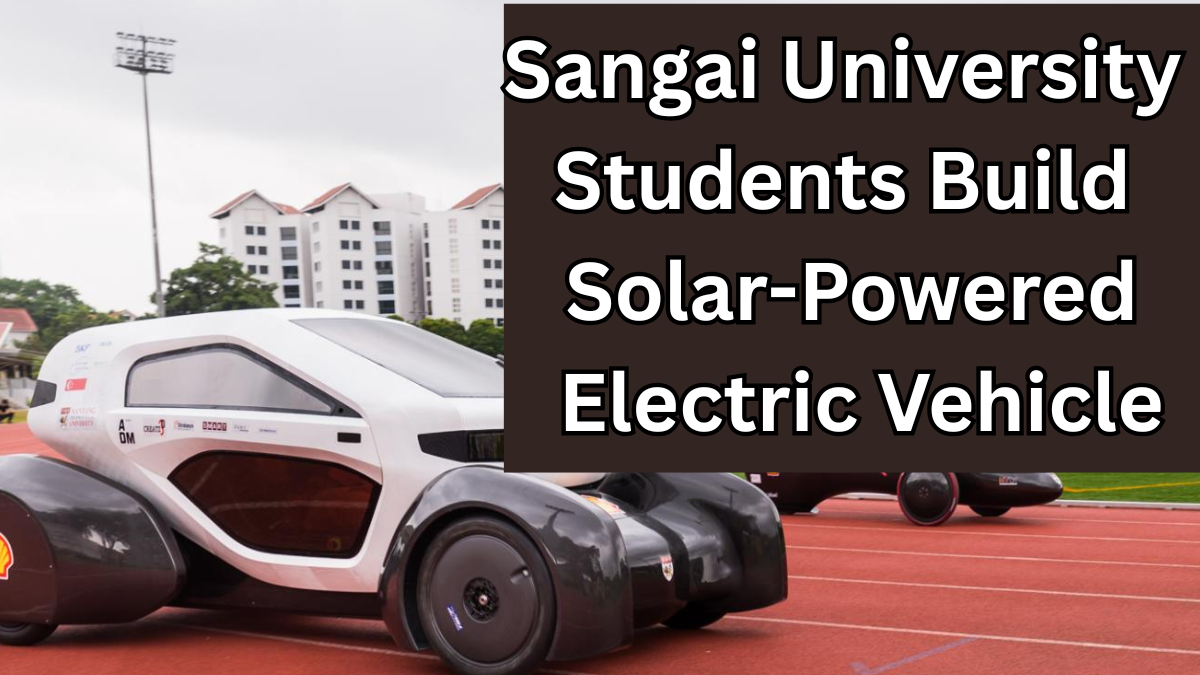At a time when the world is shifting towards sustainable transport, a group of students from Sangai University has successfully developed a solar-powered electric vehicle (EV). This remarkable achievement is not just a win for their university but also a proud milestone in the growing trend of Student EV Projects across India.
This project showcases the power of engineering innovation when paired with determination and fresh perspectives.

The Project: Solar-Powered EV Built by Students
The solar-powered EV project was entirely designed and built by students of Sangai University’s engineering department. The team focused on creating an affordable, sustainable vehicle that could address the growing need for green transportation.
Key Features of the Solar-Powered EV
-
Solar Panels: Fitted on the vehicle’s roof to ensure continuous charging.
-
Zero Emissions: Environmentally friendly and pollution-free.
-
Lightweight Design: Built for efficiency and smooth urban travel.
-
Affordable Build: Uses cost-effective materials to keep the vehicle budget-friendly.
Overview of the Sangai University Student EV Project
| Feature | Description |
|---|---|
| Power Source | Solar Panels + Electric Battery |
| Team Involved | Sangai University Engineering Students |
| Environmental Impact | Zero Emissions, Sustainable Mobility |
| Highlighted Technology | Lightweight Chassis, Solar Integration |
| Project Focus | Student EV Projects, Engineering Innovation |
Why This Project Matters: Real-World Learning for Students
This Student EV Project provides students with more than just academic experience. It empowers them to:
-
Apply theoretical knowledge in a practical setting.
-
Collaborate as a team to solve real-world problems.
-
Contribute to engineering innovation for sustainable development.
-
Enhance their skills for the competitive EV job market.
The Growing Trend: Student EV Projects in India
Across India, Student EV Projects are becoming the new norm in engineering colleges. These initiatives encourage students to:
-
Develop green, innovative solutions.
-
Compete in national-level innovation contests.
-
Gain hands-on experience in the rapidly expanding EV sector.
-
Build prototypes that could influence future transportation systems.
Student Voices: Passion for Engineering Innovation
The Sangai University students expressed their excitement about contributing to engineering innovation.
-
“This project allowed us to push boundaries and explore the future of transport,” said one team member.
-
“Working on a solar-powered EV helped us apply what we learned in the classroom to solve real problems.”
Their journey is inspiring other young engineers to take part in Student EV Projects and pursue creative green solutions.
Looking Ahead: The Future of Student EV Projects
Sangai University plans to support more Student EV Projects in the future. The university is looking to:
-
Provide additional funding for student-led innovations.
-
Build dedicated labs for EV research.
-
Partner with EV companies for internships and mentorship programs.
By nurturing engineering innovation at the grassroots level, Sangai University is setting a great example for institutions across the country.
FAQs
1. What is the key highlight of the Sangai University Student EV Project?
The key highlight is the solar-powered electric vehicle designed entirely by students, focusing on sustainability, affordability, and real-world application.
2. How does this project contribute to engineering innovation?
The project integrates solar charging technology with electric mobility, offering students practical experience in creating eco-friendly transportation solutions.
3. Are Student EV Projects becoming common in India?
Yes, Student EV Projects are rapidly gaining popularity in Indian universities as they promote hands-on learning and green engineering solutions.
4. What support does Sangai University provide for such projects?
Sangai University encourages engineering innovation by offering project funding, technical mentorship, and plans to expand EV research facilities in the future.
Click here to learn more